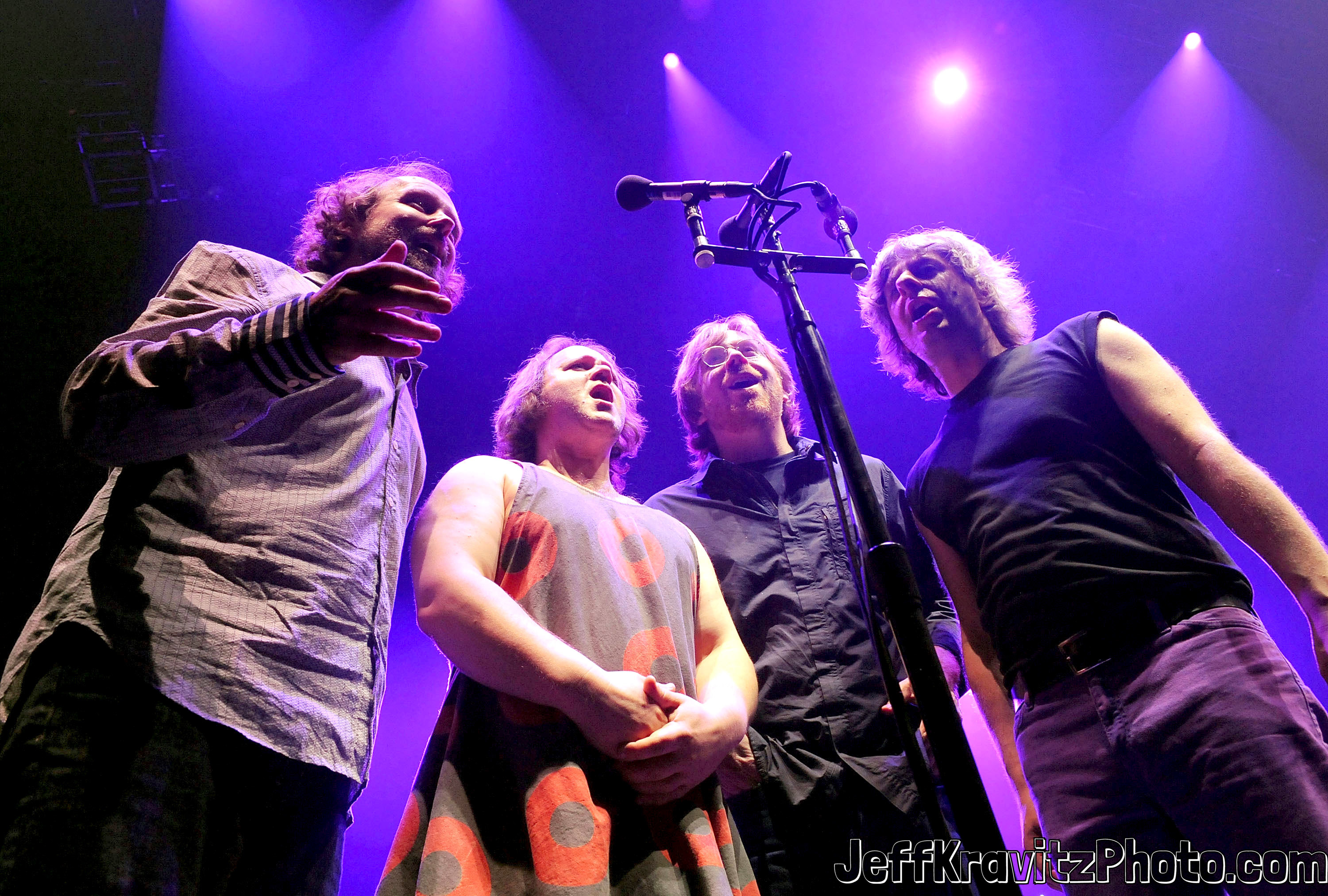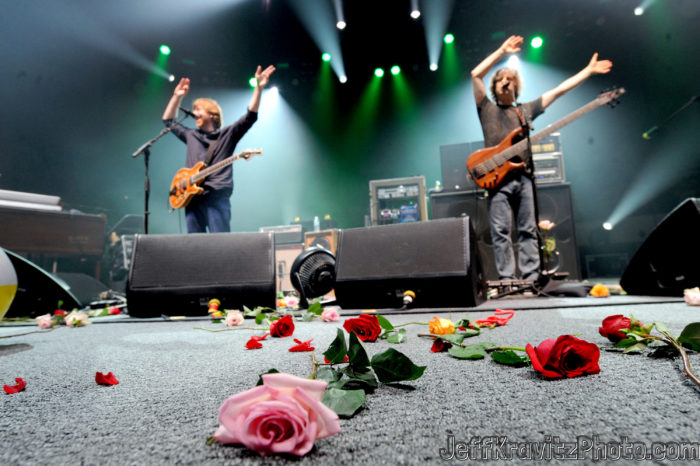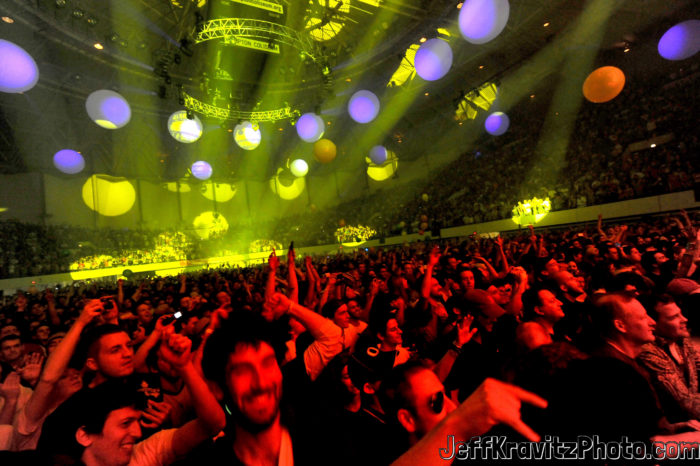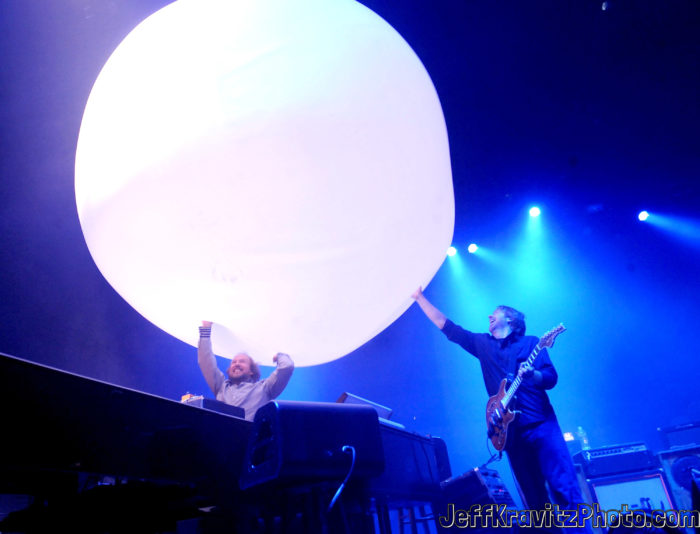10 Years Ago, Phish Reunited at Hampton: Read Our 2009 Cover Story

March 6, 2019 marks the 10th anniversary of Phish’s three-night reunion run at Hampton Coliseum, ushering in a new era for the jam quartet, which fans – or more accurately “phans” – refer to as Phish 3.0.
To celebrate the occasion we revisit Phish’s June 2009 Relix cover story. Within the interview, bassist Mike Gordon explores how the band got back together. “It’s a new era for us,” he says at one point. “I’m not in my 20s or 30s anymore. I’m in my 40s and I have to find a new balance for Phish in my life.”
After a much-needed, five year hiatus, Phish 3.0 began on March 6, 2009 and it’s still going strong.
Read the full story below.
Phish: Back on the Train
Following many months of fan anticipation that occasionally bordered on full-fledged mania, Phish finally delivered its first public performance in over four and a half years on March 6. Starting things off with “Fluffhead,” the group manifested a renewed commitment to dig in and deliver the most complex compositions of its early years, while harkening back to that era by revisiting its original stage configuration, bringing out the trampolines and even giving Jon Fishman some quality vacuum time. During the three nights at Hampton Coliseum, the band members also drew on the personal and musical development that they had experienced since Phish’s “Final” shows in August 2004. In so doing, the group delivered extended performances marked by the length of its setlists if not always by the depth of its improvisation. Nonetheless, Phish certainly fulfilled the promise that bassist Mike Gordon explains the band wished to offer its audience: “We wanted to come back and be able to say, ‘We’re really aiming to deliver here. We’re going to give you a lot, we’re not going to skimp.’”
A few weeks after these shows, on an early April morning before resuming work with producer Steve Lillywhite on Phish’s forthcoming studio recording, Gordon took some time to reflect on the series of events that led the group back to the stage. Prompted by photos from the Hampton performances, Gordon offered his own mental snapshots of the three nights. The bassist shared details regarding the return of particular songs to the rotation, while delving into the debuts of others (such as the title track to 2004’s Undermind, which Gordon explains, “I really like, it’s a fun groove – but because we broke up right when we made that album, those songs just didn’t get as much time.” ). Gordon also muses on the band members’ changing roles as they enter their 40s, attempting to strike a balance with family, solo careers and the seemingly self-animated entity that is Phish.

Can you take us through that initial rehearsal when the four of you finally performed together again? What was the first song you played?
First, we went through a list of 700 songs we had covered, including little teases, in order to pick what we wanted to play at Hampton, going around in a circle. And we wanted to play long sets, so we put together a list of 75 songs. With Trey thinking and working on setlist ideas, it ended up very different from how we first sketched it. [Ed note: 84 were played over the three days]
But after we sat there for what seemed like hours doing that, we ended up jamming a little bit. We didn’t have our own gear and it was difficult to dial in the sound even just in the practice studio with the four of us. But then we played “Back On The Train” and all of a sudden were all playing in that way where we’re just subconsciously weaving in and out of each others’ lines, leaving holes in the rhythm for the other people to fill. And that was an incredible feeling. I was like, “Ohhh yeah, this band has a real subconscious chemistry and it’s good to be back.”
I had to get used to the dynamic again because with my own band I get to do a lot of the writing and a lot of the decision-making. So going back to the quiet mode I get in with Phish was a little bit of culture shock. But other than that, the chemistry and the relating and jamming was comfortable from the get-go.
We then jumped pretty quickly into some songs that we’re saving for the new album. We didn’t know how many of the new songs we’d play and ended up not really doing many of the really new ones.
Was there any precipitating factor or moment that led to the band’s reunion?
There’s no one moment, but there were landmark moments. A couple of these moments might have been when we had dinners together. Trey’s a good cook and one time he made us a midnight dinner in Vermont. That was the first time we had gotten together since the break up, maybe a year and a half after it. Then we had another dinner, and the dinners felt good and the conversation was like jamming onstage. One night at this little restaurant, Trey was talking about how when we sat there, Fish might have been the talkative one; I was the one who didn’t say much and then had a funny comment every once in a while – everyone had their roles and we were sort of riffing off each other. So maybe that was the moment.
There were a lot of good reasons to try and it was more a question of why weren’t we doing it. We broke up because we needed a break after [playing] since we were 18 years old, and people needed to get healthy. There were other reasons too, having to do with ironing out some business stuff and some personality stuff – although we’ve always gotten along, so it was very subtle. More than anything, it was people’s schedules. I knew that with me, I really needed to do my solo album and put together a band and start touring and really jump-start my solo career, so it can be an ongoing thing. That was really important to me. And there were some people who might have wanted to do it sooner, but I just said, “I can’t.” So it was timing. Timing is everything.

At some point though, the band decided to book a room and put things in motion. How long was that planned?
There were moments early on that we didn’t follow through with. Maybe someone said, “Can we play New Year’s ‘08?” Or maybe [it was] earlier – New Year’s ‘07? I definitely would have said no because I was busy. There are always a million ideas floating around. We had this one idea to go around the country and play in revolving restaurants or only play in mom-and-pop music stores. So the idea for Hampton, I don’t know when the moment would have been. I think it was Trey saying it would always be good to have something on the calendar rather than just talking about it ambiguously.
The four of you were at Hampton a few days prior to the first show. Can you describe the preparation that took place at the venue?
We had 36 days of practice scheduled from November until the shows and then we were in there for three days, playing all day. We kept reviewing the hard stuff – the stuff with a lot of memorized compositions – but we were trying to get used to everything: jamming and songs and compositions in the context of being back on the big stage in an echoey room.
For the first few hours, maybe the whole first day, it was really difficult for me to just get used to the echo. You get used to these rooms by growing into them and it was a sea of echo where every note that everyone played lasted for five seconds. You know how it is hard to talk when a cell phone is giving you an echo of your own voice? That’s what it was like. But we were just going through everything exhaustively.
What led you to revert back to your original stage configuration? [Ed note: Until 1999, all four musicians lined up across the stage, with Page and Fishman serving as bookends, while Trey and Mike stood in the middle. Then Fishman moved to the center behind Mike with Trey at stage left. In 2002 when the group returned from hiatus, Trey and Mike switched places, which brought Trey back to the center.]
I think Trey saw a picture. I really like it because even though it’s nice for everyone in the band to hear the drums from a closer distance, which was the reason for the changing it the other way, I really like being nestled in the middle with the instruments that take a wider footprint on the side. Plus, everyone is able to see Fish a little better. A lot of decisions are Trey’s, a lot of ideas are Trey’s – but I was really happy about that.
What is your critical assessment of the music at Hampton?
The first night, overall, wasn’t my favorite. The second two nights, I loved. The first night was a bit mental for me because we were playing so many of the songs that have so many composed parts all clustered together and that was symbolic of the mental aspect. I said that to [producer] Steve Lillywhite after the second night. I came up to him and said, “That was better. I thought the first night felt a little mental.” Then he pointed to his head and said, “The first night seemed as if it was from here.” Then he moved to his chest and said, “It felt like the second night was more from here.” And I said, “Yeah, if the third night can be from the butt, we’ll be in good shape.”
The first night was also a little troublesome, with getting used to the sound again and just thinking too much rather than just allowing myself to get absorbed. All of the second two nights felt great to me, with incredible energy and incredible flow – where it didn’t matter what song we were playing, it just felt like part of this big flowing animal. And it wasn’t about intoxication because all the band members were sober – no wine, no anything – and it wasn’t about anything else except the flow of the songs. I was really impressed with how it felt those second two nights.
When did the band decide to open with “Fluffhead” ?
It was one of the big ideas, far in advance. It may be the hardest Phish song to learn because there are so many sections that are memorized and it’s not just that they’re memorized, it’s that they’re not always predictable. It’s not just a scale and a key and a meter. And yet it’s joyous and almost silly and lighthearted and we’d screwed it up before or bailed out from doing it, whatever it was.

At the IT festival in Aug. 2003, Trey told the crowd that you didn’t want to play “Fluffhead.” Was that the case?
We had practiced [the song], which takes a day or two. I really want to see a Phish cover band take on that kind of thing. Anyhow, we finally practiced it and I had probably learned it better than anyone, although in their defense there are less bass notes per bar than Page and Trey have to deal with. We hadn’t played it yet although we’d done it in the practice room. So Trey came up to me and said, “So do you want to give it a try?” And I said, “Yeah, let’s play it.” and then he went up to the microphone and said, “Mike doesn’t want to play it.” [Ed note: DICK!]
Phish performed one of Page’s solo tunes at Hampton [ “Beauty of a Broken Heart” ]. Did the band practice any of yours?
We actually learned “Andelmans’ Yard” [from Gordon’s album The Green Sparrow ]. Even though it might sound like a simple song – I mean it’s not even a hundred times as complicated as ‘It’s Ice’ – it’s got enough changes where maybe it didn’t feel right.
Often with Phish, I’ll write a lot of songs and we don’t play them [laughs]. Maybe because I’m not as aggressive at promoting them and saying, “Hey let’s practice my song now.” Although whenever I do, the guys are very encouraging. Or maybe my songs are just quirky – and as with “Andelmans’ Yard,” it’s hard to sink yourself into something when there are so many parts to wrap your brain around. Plus, I guess what happened was it got to be all about the old songs and we only had a couple of newer ones [on the setlist].
I’ve written 100 songs since we broke up and we might end up playing one or two of them. But I’m not the songwriter in this band except on occasion. I’m the occasional songwriter. And Trey is prolific and we have a lot of great songs from him.
Some songs such as “Sanity” and “Guelah Papyrus” hadn’t been played since before your previous hiatus. What drew the band to those and how quickly did it take you all to get up to speed on them?
“Sanity” was a last minute thing because we wanted to try blow up one of those big balls, although it didn’t quite blow up. [Ed note: Several large, inflatable balls in an oval formation hung above the audience that lighting director Chris Kuroda incorporated into the show. They were released at several points throughout the weekend.]
“Guelah” – I know a few band members were psyched about it, but what I really like is the fugue in the middle called “The Asse Festival.” It’s one of two fugues Trey wrote that I think are masterpieces in the sense of theme and variations, where a melody is just twisted in all different ways. That one, and “All Things Reconsidered.” So I think it’s an incredible piece of music with that middle section, and then to have a kind of a reggae-ish groove makes it fun on a couple of different levels.
We had to learn them all ourselves first which was a week or two of work because with an atonal fugue, there isn’t really a meter or a key, and to play stuff that I couldn’t easily comp was difficult. It was all in my brain but I had to sit there, use a little bit of muscle memory where my fingers would remember what my ears didn’t and then my fingers would forget and my ears would pick up for a few notes. In some cases there was written music, and in other cases it was just listening to tape and trying to pick it up on bass. So, I used those four methods and tried to remember how it all went. The rhythm is actually the easiest to remember. I could sort of hum the rhythm of basslines. But it was really weird to find how much of that stuff was in my brain somewhere to get pulled out.
Were there any songs that you decided not to play because for one reason or another they didn’t feel comfortable any more?
For a couple weeks in November, I said I wouldn’t play “Mike’s Song.” It was something I wrote when I was a sophomore in college and it’s harder to relate to it now. Why should I need to keep playing it if I can’t relate to it – just because it’s a big showstopper? But I came around. A lot of these songs were 20 years old and sometimes it’s hard to infuse emotion into something when it’s from a different era, although sometimes it’s easier when you see it in a different way.
Songs always come from a passionate place but the way that they get developed changes over the years. So, “Scent of a Mule,” I like – but it has a quality that it’s harder to relate to now, along with “Possum” which is Jeff Holdsworth’s song.
I was actually going into this era wishing that I wouldn’t sing any of my old songs because I’ve written 100 songs, why do these old ones? But then I saw that what we were doing was rekindling all of the passion that was in this material and kind of rebuilding the Phish essence by going back to its roots and finding what’s always been there – and these older songs have a lot of that. So I think it was a good way to do it, and now we get to move forward.

Hampton featured lengthy setlists as opposed to extended versions of songs. Was this a conscious decision in order to present the many flavors of the band?
I don’t think it was for the sake of offering different flavors because you can have too many flavors – it’s not always a good idea. Trey listened to some ‘93, ‘94 Phish and was saying that there were more songs per set and sometimes the sets were cool without having every song be a long jam by going to these different sorts of places because of the way the song was composed. So that was a conscious awareness, and that’s another reason why I’m so glad that they seemed to flow in a way where it was as if we were jamming even if it wasn’t improvised.
How are you applying the Hampton experience to the future?
Right now, we’re having a great time in the studio, [and] there’s tons of new material. A lot [of it] we’ll never get to because everyone has so many songs. I won’t talk about my own stuff, but for me there’s a new level of maturity in Trey’s songs where even the stuff that sounds kind of grooving and fun in a retro way, sounds fresh and brand new to me because of that maturity. The same song – five, 10 or 15 years ago – might have been meaningful but a little bit awkward in certain ways. Now, instead of awkward, it’s just raging.
So that’s pretty exciting and I’m very passionate about continuing my solo career, even though it’s in its beginning stages. This is a very busy year for Phish with all of the practicing and touring and recording happening in the same six months. Hopefully we’ll have huge chunks of the year when I can work on my solo career and movies and other things. And I think we’ll all be doing that.
It’s a new era for us. I’m not in my 20s or 30s anymore. I’m in my 40s and I have to find a new balance for Phish in my life. I seem to be finding it – or feeling like I will find it – so I’m very positive.



















